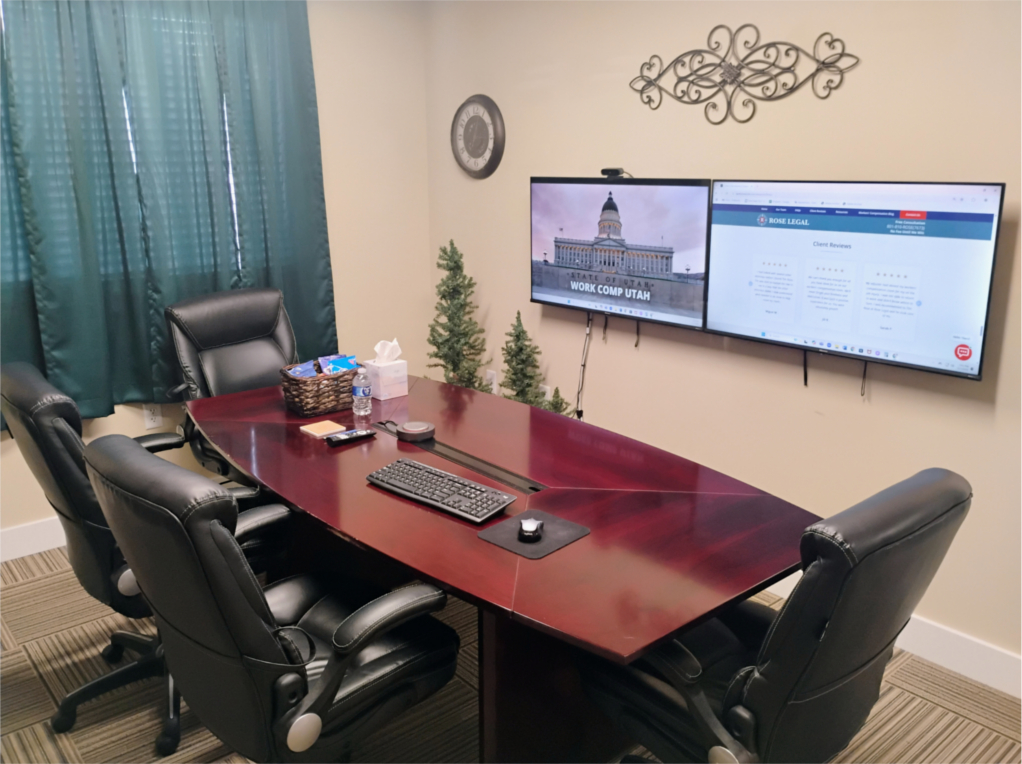- Free Consultation: 801-810-7673 Tap Here to Call Us
Preparing for a Mediation
There are many notable steps in the workers’ compensation process, and mediation is a potential one that can bring a favorable resolution to your claim. It is worth going over what a workers’ comp mediation is, what a typical mediation looks like, and the things you can do to make sure your mediation goes smoothly.
What is a Mediation?
A workers’ comp mediation is a conference involving the two parties of the case and a neutral mediator. The purpose of a mediation is to settle a case before it goes to a court hearing. It usually lasts about an hour, but times may vary depending on the case and on how willing everyone is to come to an agreement. The people involved in a mediation typically include:
- the injured employee for the case, and the lawyer for the injured employee (such as a Rose Legal workers’ comp attorney)
- the mediator — an unbiased representative from the Utah Labor Commission or a private mediation company who will act as a go-between for both parties in the case
- the workers’ compensation insurance company representative (often the adjuster), their attorney, and potentially a representative for the employer — (typically, mediation only has the workers’ comp attorney present)
A judge will not be present for the mediation, which is a less formal meeting than a court hearing. A mediation can take place at any time during the workers’ compensation process, arranged by agreement of both parties in the case.

Overview of a Typical Mediation
- The mediator reviews the basics of the case
- The injured employee’s attorney summarizes the case (and sometimes the worker will make a statement regarding the injury or illness, medical treatment, current health, etc)
- The employer’s insurance agent or lawyer shares their view of the case
- The mediator may ask questions to both parties
- The mediator separates the two parties (either in different rooms if it’s an in-person conference, or through separate channels if it’s a video conference such as a Zoom call)
- The mediator alternates discussing the case with each party, going over the strengths and weaknesses of each side
- The injured employee’s attorney presents a starting demand for the settlement agreement to the mediator — the mediator then conveys this to the other side (the demand will likely be a dollar amount to settle the claim in full, but may include additional items of dispute)
- The representative for the insurance company (and/or employer) makes their initial offer in response — the mediator then relays this back to the injured worker and attorney
- This back-and-forth continues either until the settlement amount and terms reach a place that both sides agree on… or until both sides concede to continue the case with a court hearing
Preparing for Your Workers’ Comp Mediation
It is important to cooperate with your workers’ comp attorney in order to make sure evidence. Your attorney will need to know all the facts regarding your job, the workplace incident, your medical treatment, the value of your medical bills and lost wages, and any supporting medical records prior to the mediation.
It is best to arrive fifteen minutes before the mediation starts, in order to have time for any final preparations. Your attorney may give advice of what to say—and what not to say—in front of the mediator. It is best to stick to the facts of your case, rather than vent frustrations with the employer or insurance company. Put your best foot forward by dressing neatly—a suit is not expected, but it is worthwhile to at least look clean and professional.

After the Mediation
If you settle and agree on a dollar amount and terms with the workers’ compensation insurance carrier, the documents needed will be prepared for signatures within a few weeks. The settlement agreement will then be sent to the judge (ALJ) for approval. It usually takes about 30 to 45 days to receive compensation, depending on the agreement and if there are medical liens from Medicaid, Medicare, the VA, or a private health insurance company. The funds in turn may take the form of a lump-sum agreement or a series of installments.
If the case is not settled, the next step will likely be a court hearing. This involves testifying under oath and presenting your case before a judge. It is a lengthier process that is generally more costly for both parties. As such it is worth noting: even if a mediation ends without reaching a settlement agreement, it is still possible for the two parties to settle at a later time before the hearing. The best step to take next in your case can depend on a wide variety of factors. Keep in contact with your Rose Legal attorney for advice during each stage of the process, in order to know when the timing is right for negotiation and compromise.







